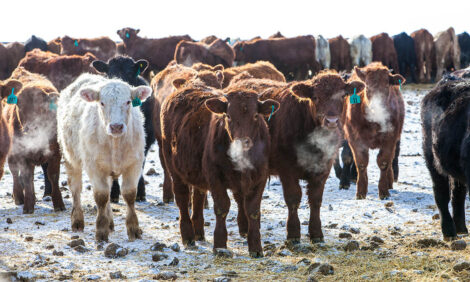



Drought Leads to Record Beef Exports of Over 100,000 tonnes
AUSTRALIA – After more than six years of waiting, weak cattle prices and severe drought conditions have led to a new Australian beef export record of over 100,000 tonnes for May.This is despite competition from reinvigorated US traders who have capitalised on Japan’s relaxed beef restrictions in light of Japanese approval of US beef after bovine spongiform encephalopathy fears were eased in the new year.
The new record, standing at 103,207 tonnes swt (shipped weight), was over 8,000 tonnes greater than the previous record set in November 2006, say market experts at Meat and Livestock Australia (MLA).
In recent weeks cattle have been frantically relocated to feed and rushed through feedlots, this has caused historically high beef production leading to exports rising to China, Korea, the Middle East and EU with Australia’s weak cattle values facilitating trading.
“Average weekly eastern states slaughter during April and May were up 18 per cent year-on-year, at 137,535 head and 157,093 head per week, respectively – driven by drought and deteriorating seasonal conditions, especially in Queensland,” said MLA analysts. “Additionally, the lower cattle prices experienced throughout the month helped offset the impact of the high A$ (albeit falling), maintaining Australian beef in a competitive position in most markets.”
Importantly, MLA revealed that marginal markets accounted for almost a third of the trade in May. This shows a strengthening foothold in emerging beef markets, which is where 'huge' opportunities lie, commented Dr Craig Emerson, Minister for Trade and Competitiveness.
“Growth in Asia presents Australia and our food industry with huge opportunities,” Dr Emerson said. “Asia’s expanding middle class wants high–quality food from clean, green suppliers, and Australia is in a perfect position to meet that demand.”
The view of the Ministry of Agriculture is that all has been done to ensure that the right people are in position to secure growing export quantities in the months to come.
Senator Joe Ludwig said he was satisfied that the personnel is right: “We’ve answered the industry’s calls to increase the number of Australian specialists who provide agricultural and technical knowledge on the ground in key export markets."
“In addition, new market access liaison officers will be deployed across the Asian region to ensure industry has a clear and consistent point of contact on all market access issues,” added Mr Ludwig.
Of the beef exported, 30 per cent went to markets other than the US, Japan and Korea, compared to only 11 per cent in 2006, added MLA analysts. This highlights the increasing demand for red meat in developing Asian markets.
However, MLA stressed that the trio remains key for Australian beef sales with Japan remaining Australia’s largest export market at 30,374 tonnes and the US in second with 19,580 tonnes.
“Exports to Japan, Australia’s largest export beef market registered a solid month. While this was 1 per cent below the corresponding month in 2012, it was the highest volume since July last year,” added MLA. “Overall Australian trading conditions to Japan remain tough, with the combined influence of a sluggish economy, unfavourable currency levels and increased competition from US beef. For the first five months of 2013, Australian beef exports to Japan are down 4 per cent year-on-year, at 115,827 tonnes swt.”
Further difficulties were met in the form of Brazil competition. According to the MLA, shipping volumes to Russia and Singapore fell considerably year on year.
Notable market movements include China which imported 11,486 tonnes swt, an increase of 1,520 per cent year on year. This placed China a close fourth behind Japan, the US and Korea, which has pressured Australian beef recently.
“The battle for the mantle of Australia’s third largest beef export market continues to heat up between China and Korea,” said MLA. “Korea, the long-time holder of the third position, registered 12,423 tonnes swt of Australian beef during May an increase of 36 per cent year-on-year compared to 11,486 tonnes swt to China (up 1520 per cent year-on-year) – which had exceeded Korea for the past three months.”
But, demand was strong elsewhere, Saudi Arabia stood out amongst a month of busy trading with the Middle East, buying over half (3,773 tonnes) of the beef shipped to the Middle East (6,168 tonnes).
Michael Priestley
News Team - Editor
Mainly production and market stories on ruminants sector. Works closely with sustainability consultants at FAI Farms



